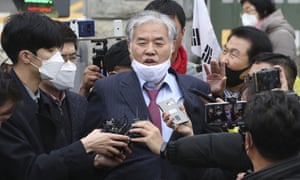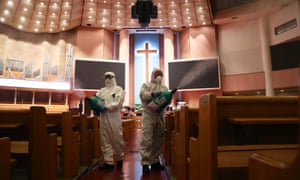–
Four months ago, South Korea was basking in international praise for containing the coronavirus pandemic. But now it stands on the brink of a second serious outbreak, and much of the blame is again being directed at the country’s evangelical churches.
Health authorities say a recent surge in cases traced to Sarang Jeil, an ultra-conservative church in Seoul, have contributed to an outbreak that is now affecting major cities across the country. Some members of its congregation also attended a large anti-government rally in the capital last weekend that officials believe could have helped the virus spread.
Fears that South Korea is teetering on the edge of a major outbreak were supported by data released on Sunday showing the biggest number of daily cases for months, with the Korea Centre for Disease Control and Prevention reported 397 new infections, the highest since 7 March. The nationwide total rose to 17,399, with 309 deaths.
The surge in coronavirus cases, reported in all of the country’s major cities, prompted the government to raise social distancing restrictions and close nightclubs, karaoke bars, buffets and cyber-cafes in the greater Seoul region.
Indoor gatherings have been limited to fewer than 50 people, and to no more than 100 outdoors, while spectators are again banned from attending football and baseball matches. The Seoul city government restricted demonstrations in the city to fewer than 10 people from Friday until the end of the month.
Similar measures will be imposed other areas across the country from Sunday, although they will not be obligatory in areas with relatively few infections.
With in-person church services also banned, the collision between public health measures and South Korea’s evangelical churches is presenting Moon with his toughest political challenge of the pandemic, months after more than 5,000 cases were traced to the Shincheonji Church of Jesus, a secretive Christian sect that some experts call a cult, based in the south-eastern city of Daegu. Lee Man-hee, the 88-year-old leader of Shincheonji, was arrested for allegedly giving inaccurate records of church gatherings and false lists of its members to health authorities.
‘Very serious situation’
South Korean’s vice health minister, Kim Gang-lip, warned that the country faced a “very serious situation”, adding that authorities were trying to track and trace people who had attended the anti-government rally.
While clusters have been traced to restaurants, schools and call centres, many of the new cases are connected to Sarang Jeil, whose far-right leader, Jun Kwang-hun, is an outspoken critic of the president, Moon Jae-in.
Francis Jae-ryong Song, a sociology professor at Kyung Hee University in Seoul, noted that some of South Korea’s evangelical churches had followed government guidelines on virus prevention, but said others, including Sarang Jeil, had continued to hold frequent, packed services.
But given that large numbers of people gathered in Seoul before last weekend’s protests – including a vigil following the death of the mayor of Seoul, Park Won-son, and performances of Phantom of the Opera, Song cautioned against holding church members solely responsible for the recent rise in infections.
“Doing that could leave the authorities open to criticism that they are politicising the coronavirus situation in some kind of witch hunt,” Song said. “The government and the media should be careful that the latest measures against church congregations don’t turn into an attack on religious freedom.”

Jun, who shared a microphone with other speakers at the rally, was himself admitted to hospital on Monday after testing positive for Covid-19. At least 60 infections have been linked to the protest, while 796 cases had been traced to his church as of Saturday.
Hundreds of of Sarang Jeil followers have refused to be tested, according to local media, while the church provided an inaccurate membership list to health authorities, prompting the health ministry and the Seoul city government to file criminal complaints against Jun.
Members of Sarang Jeil claim they are the victims of a deliberate “virus attack” from the outside, and that Moon is exploiting public anger towards the church to deflect criticism of his faltering attempts to deal with Seoul’s housing crisis.
“We believe in freedom of speech and worship, and thought those freedoms were enjoyed by all South Koreans until the government decided to use us as scapegoats,” Kim Young-soon, a Sarang Jeil member, told the Guardian. “It is intolerable that we are being persecuted in this way.”

Church members dismiss Covid links
South Korea’s protestant churches were heavily influenced by American Presbyterian and Methodist missionaries in the late 19th and early 20th century, while Christianity flourished during Japan’s 1910-45 colonial rule of the Korean peninsula and the 1950-53 Korean War.
The conflict resulted in a deep mistrust of North Korea that finds expression among today’s conservative churches in criticism of any South Korean leader who, like Moon, are seen as “soft” on North Korea.
“Most evangelical churches, including Sarang Jeil, share that ideology and believe the Moon administration is explicitly pro-China and pro-North Korea,” said Song.
Kim’s friend and fellow congregant, Park Jun-il, dismissed reports linking the virus to church services. “No one has proved that worshipping in large numbers has caused the virus to spread,” Park said. “I refuse to believe it. There are huge numbers of people packed on to beaches like sardines but there hasn’t been a single case reported. How is that possible?”
Paul S Cha, an assistant professor of Korean Studies at the University of Hong Kong, speculated that conservative churches such as Sarang Jeil believed the Covid-19 pandemic was “fake news”.
“They do not trust the government, and many of these churches are organised in a hierarchical manner, with the head pastors wielding tremendous power,” Cha said. “If the head pastor declares that church members should meet and not wear masks, then the congregation will generally comply.
“For some of the more evangelical denominations, there might be a belief that wearing masks or practicing social distancing are signs of a lack of faith in God’s protective power.”














